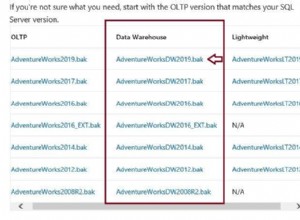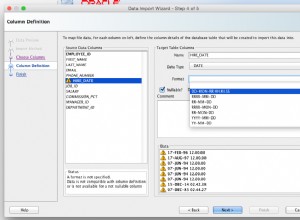मैं इसे एक प्रवास के माध्यम से करूँगा। पहले प्रोग्रामिक रूप से अद्वितीय बाधा नाम प्राप्त करें, फिर ड्रॉप करें और फिर से जोड़ें (चूंकि इसे बदलने से ऐसा लगता है कि यह केवल एफके बाधाओं के लिए काम करता है, अद्वितीय बाधाएं नहीं)। रिवर्स माइग्रेशन जोड़ें जो इसे भी पूर्ववत कर देता है।
from django.db import migrations, connection
def _make_deferrable(apps, schema_editor):
"""
Change the unique constraint to be deferrable
"""
# Get the db name of the constraint
MyModel = apps.get_model('myapp', 'MyModel')
CONSTRAINT_NAME = schema_editor._constraint_names(MYModel,
['col1', 'col2'],
unique=True)[0]
TABLE_NAME = MyModel._meta.db_table
# Drop then re-add with deferrable as ALTER doesnt seem to work for unique constraints in psql
with schema_editor.connection.create_cursor() as curs:
curs.execute(
f'ALTER TABLE {TABLE_NAME} DROP CONSTRAINT "{CONSTRAINT_NAME}";'
)
curs.execute(
f'ALTER TABLE {TABLE_NAME} ADD CONSTRAINT'
f' {CONSTRAINT_NAME}'
f' UNIQUE (col1, col2) DEFERRABLE INITIALLY DEFERRED;'
)
def _unmake_deferrable(apps, schema_editor):
"""
Reverse the unique constraint to be not deferrable
"""
# Get the db name of unique constraint
MyModel = apps.get_model('myapp', 'MyModel')
CONSTRAINT_NAME = schema_editor._constraint_names(MyModel,
['col1', 'col2'],
unique=True)[0]
TABLE_NAME = MyModel._meta.db_table
with schema_editor.connection.create_cursor() as curs:
curs.execute(
f'ALTER TABLE {TABLE_NAME} DROP CONSTRAINT "{CONSTRAINT_NAME}";'
)
curs.execute(
f'ALTER TABLE {TABLE_NAME} ADD CONSTRAINT'
f' {CONSTRAINT_NAME}'
f' UNIQUE (col1, col2) NOT DEFERRABLE;'
)
class Migration(migrations.Migration):
dependencies = [
('myapp', '<previous_mig>'),
]
operations = [
migrations.RunPython(code=_make_deferrable, reverse_code=_unmake_deferrable)
]




